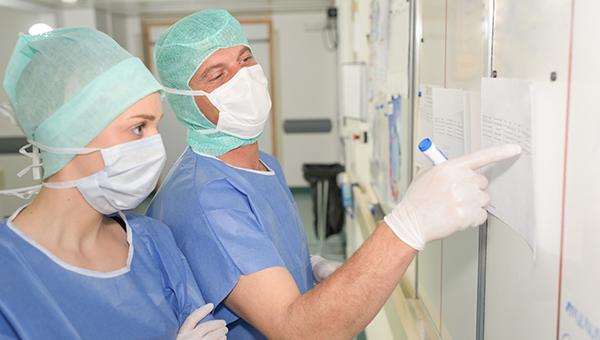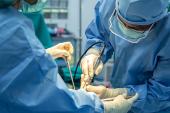Consider COVID-19 History in Pre-op CV Screening, Doctors Say
They advise waiting at least 7 weeks after a COVID-19 diagnosis before going ahead with elective noncardiac surgery.

Preoperative cardiovascular assessment before elective noncardiac surgery should include consideration of a prior COVID-19 diagnosis, according to three doctors who advise a delay of at least several weeks before taking patients with such a history to the operating room.
Lead author Nidhi Rohatgi, MD (Stanford University School of Medicine, CA), and colleagues note that COVID-19 has been associated with a range of cardiovascular complications, including myocardial injury, ACS, and thromboembolism, with unknown long-term effects after recovery from the viral infection.
Though standard guidance regarding the perioperative CV evaluation and management of patients undergoing noncardiac surgery—such as that from the American College of Cardiology and the American Heart Association—can be used in most patients with COVID-19, the severity of a prior run-in with the viral disease needs to be taken into account, they write in their viewpoint, published online January 12, 2022, ahead of print in JAMA Surgery.
“It felt like these guidelines currently do not capture what these patients with COVID have gone through,” Rohatgi told TCMTD. “It has become harder and harder to assess the cardiovascular/respiratory risk of sending these patients to the operating room at this point, especially in patients who still have some lingering symptoms from COVID.”
She and her co-authors make some suggestions on how to make that call, and one of their major recommendations is to delay elective surgery for at least 7 weeks after a COVID-19 diagnosis, regardless of severity. That’s based on a large prospective study from GlobalSurg-COVIDSurg collaborative showing that 30-day adjusted postoperative mortality was substantially higher in patients who had an operation within 7 weeks of being diagnosed with COVID-19 than in those who waited longer to undergo surgery (who had a mortality rate similar to patients without a prior COVID-19 diagnosis).
Moreover, among COVID-19 patients who waited at least 7 weeks to have their operation, those with ongoing symptoms were more likely to die than those who had been asymptomatic or whose symptoms had resolved. Therefore, “longer delays may be reasonable in patients with persistent symptoms,” Rohatgi et al advise, adding, however, that the ideal timing is not known.
A table in the viewpoint lays out the proposed timing of elective noncardiac surgery in patients with a history of COVID-19, broken down by estimated MACE risk. The proposed 7-week delay applies to all such patients.
So 7 weeks, maybe it’s 8 weeks, maybe it’s longer for patients who have persistent symptoms, but just give it a moment of pause to think, ‘Is this patient really ready?’ Nidhi Rohatgi
After that interval, patients who had asymptomatic, mild, or moderate COVID-19 can proceed with surgery if MACE risk is assessed as low. If MACE risk is elevated, the operation can be performed with the caveat that “in selected patients, additional preoperative testing may be needed as guided by cardiovascular diagnoses, symptoms, and signs and in consultation with cardiovascular disease specialists,” the authors write. That testing might incorporate ECG, biomarkers, ambulatory arrhythmia monitoring, transthoracic echocardiography, or cardiac ischemia evaluations, they say, acknowledging the lack of data informing this question.
For patients with prior severe/critical COVID-19, surgery should be delayed even longer than 7 weeks if cardiopulmonary symptoms persist, regardless of MACE risk. If cardiopulmonary symptoms have resolved, surgery can be performed without additional testing if MACE risk is low and with the possible need for further assessments if MACE risk is elevated, the authors suggest.
Rohatgi said this approach has been implemented at her center, with questions about prior COVID-19, its severity and treatment, and any ongoing symptoms being a routine part of the preop assessment. The recommendation for a 7-week delay is not a hard-and-fast rule, especially with the uncertainty introduced by an ever-changing pandemic, but they’ve tried to postpone operations until further away from a COVID-19 diagnosis whenever possible, she said.
The group doesn’t go into too much detail about what types of additional testing might be needed for higher-risk patients, and Rohatgi said that was done to avoid encouraging indiscriminate testing in all patients who have had COVID-19. “It needs to be a thorough thought process [involving] good history-taking and a physical examination to determine which particular patient needs which kind of test,” she said.
Overall, Rohatgi et al write, “preoperative cardiovascular screening must be individualized, incorporating the baseline cardiac risk, history of cardiovascular complications of COVID-19, severity of COVID-19 illness, and the clinical status after recovery, in consultation with CVD specialists. Optimization of COVID-19–associated cardiovascular disease should be undertaken when feasible to attenuate the perioperative cardiovascular risk.”
This might not be an easy task, they indicate, pointing out that there is “an interaction between the cardiac risk and ongoing respiratory symptoms, hypoxia, abnormal pulmonary function, or occult thromboembolism in patients with COVID-19.” Dyspnea, fatigue, chest pain, and palpitations commonly linger beyond the acute phase of the disease, and “patients with even mild COVID-19 may have lingering physical deconditioning and poor functional capacity for 3 months or more after the acute illness,” they note.
Ultimately, additional studies will be needed to help sort out the best way to perform a preoperative CV assessment in this situation, both retrospective analyses of patients who have already undergone surgery after COVID-19 to see how they fared over time and, more importantly, prospective investigations to determine which additional tests might be needed, Rohatgi said.
A key message, she said, is that physicians should take a moment to carefully consider whether an individual patient is ready for surgery, which she acknowledges can be challenging during the pandemic.
“I know that surgeries are canceled. We are all feeling very desperate about getting these patients back on the OR schedule,” she said, adding, however, that it’s important to consider whether the operation will improve the patient’s situation at that time. “So 7 weeks, maybe it’s 8 weeks, maybe it’s longer for patients who have persistent symptoms, but just give it a moment of pause to think, ‘Is this patient really ready?’”
Todd Neale is the Associate News Editor for TCTMD and a Senior Medical Journalist. He got his start in journalism at …
Read Full BioSources
Rohatgi N, Smilowitz NR, Reejhsinghani R. Perioperative cardiovascular considerations prior to elective noncardiac surgery in patients with a history of COVID-19. JAMA Surg. 2022;Epub ahead of print.
Disclosures
- Rohatgi reports no relevant conflicts of interest.





Comments